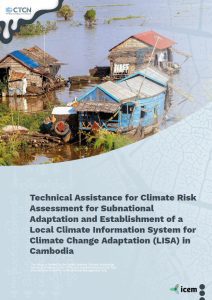
Technical Assistance for Climate Risk Assessment for Subnational Adaptation and Establishment of a Local Climate Information System for Climate Change Adaptation (LISA) in Cambodia
PROJECT BACKGROUND
Climate change impacts have potential to impact multiple sectors of the economy in Cambodia. Flood and drought pose a critical threat to the agriculture and water sector, while climate change can influence rice yields though changes in temperature and precipitation. Past floods have resulted in considerable damage to infrastructure and to communities reliant on their access. Floods are reported to be the main cause of damage to road infrastructure, after drought and storms. To address these types of impacts, it is essential that information on hazard and climate risks is regularly collected, stored, processed, analysed and translated into actionable advice on what can be done at different timescales so various stakeholders can apply the information for risk informed decision-making and planning.
This project addressed development of a local climate information system for climate change adaptation (LISA) for Battambang municipality. The LISA platform is an intuitive and user-friendly web-based data visualisation platform that enables users to explore future climate scenarios and to gain an appreciation of potential impacts and adaptation options for future climate resilient planning. The development of LISA builds on findings from an institutional assessment of climate information services, user needs assessment and climate change risk assessment at Battambang municipality.
The importance of climate information systems for informing sustainability planning in Cambodia is reflected by two projects recently completed by ICEM. These initiatives include development of knowledge-based decision support tools to strengthen sustainability planning in the context of climate change in the Mekong Delta, and at provincial and local levels in Cambodia. Implemented by ICEM and completed in June 2020, the Cambodia Mekong Delta Digital Atlas is designed to support the mandates of various ministries of the Royal Government of Cambodia (RGC) on resilient development. The Cambodia Climate Change Toolbox, implemented by ICEM in 2020, was a major output of the Mainstreaming Climate Resilience into Development Planning, Cambodia project. The Cambodia Climate Change Toolbox is an open-source information portal that provides projections and data for climate parameters in Cambodia at country, provincial, district, and local levels.
PROJECT OBJECTIVES
Combining historical hazard, exposure, sensitivity and vulnerability data with future climate change scenarios derived from climate models and informed by findings from the climate information services institutional assessment and climate risk analyses, the LISA platform is targeted at policy makers, planners, and other practitioners working at sectoral and sub-national levels. The LISA project addressed three key tasks:
- Identification of the current status of the climate information systems in Cambodia;
- Identification of stakeholder’s needs and climate change risk assessment at the selected municipality; and
- Development of LISA at the selected (Battambang) municipality.
STUDY AREA
Through consultation with key stakeholders, Battambang municipality in Cambodia was selected for undertaking the climate change risk assessment and development of the LISA platform. Criteria for municipality selection were agreed and applied to an initial long list of potential municipalities (Output 3 of the project)
KEY OUTPUTS
OUTPUT 1: DEVELOPMENT OF IMPLEMENTATION PLANNING AND COMMUNICATION DOCUMENTS
This output comprised the preparation of three deliverables: (i) Detailed work plan; (ii) Monitoring & Evaluation (M&E) plan and impact statement; and (iii) a Technical Assistance closure report.
OUTPUT 2: IDENTIFICATION OF THE CURRENT STATUS OF THE CLIMATE INFORMATION SYSTEMS IN CAMBODIA
This output’s deliverables include the following:
- D2.1 Report on the kick-off meeting and stakeholder consultations
- D2.2 Report on the review of the climate information system in Cambodia
- D2.3 Report on the investigation of best practices of operating local climate information systems
- D2.4 Initial considerations and draft concept for LISA
The stakeholder consultations provided the TA team with the opportunity to review the climate information systems in Cambodia, which was guided by WMO’s Global Framework for Climate Information Services. To evaluate current best practice in the use of climate data and information by municipalities, the TA team conducted a literature review of climate information systems in developed and developing countries. The utility of these services was assessed to inform the design of the proposed LISA application and selection of appropriate stakeholders. A concept for the web-based LISA was formulated by the TA team in collaboration with the Department of Climate Change and other key stakeholders.
OUTPUT 3: IDENTIFICATION OF STAKEHOLDER’S NEEDS AND CLIMATE CHANGE RISK ASSESSMENT AT THE SELECTED MUNICIPALITY
Output 3 comprised preparation of five deliverables, with activities proceeding over a period of six months:
- D3.1 Report on the consultations to select the most appropriate municipality to design LISA
- D3.2 Report on the mapping of potential stakeholders at the selected municipality and survey of their needs
- D3.3 Report on the climate change risk assessment at the selected municipality
- D3.4 Detailed description of the stakeholder working group, with name and contact details of the members, respective institutions, and gender.
- D3.5 Minutes of the stakeholder working group meeting with a list of participants disaggregated by gender, materials used, and summary of the discussions held
OUTPUT 4: DEVELOPMENT OF LISA AT THE SELECTED MUNICIPALITY
This output comprises preparation of eight deliverables with activities commencing in the project’s seventh month and continuing over a period of six months to the end of the project:
- D4.1 Report on the design of contents and specifications for LISA, with the initial mock-up of the system (website) and testing results.
- D4.2 Report on the design of the process of data management for LISA
- D4.3 Report on the management protocols for LISA
- D4.4 Report on the capacity building program for effective use of LISA
- D4.5 Minutes of the stakeholder working group meeting with a list of participants disaggregated by gender, materials used, and summary of the discussions held
- D4.6 Materials for the workshop (e.g., presentations, satisfaction survey template)
- D4.7 Report on the 1-day stakeholder workshop for government bodies and stakeholders
- D4.8 Copy of all materials produced under this consultancy (including programming code and databases).
For further information on the UN-CTCN LISA project, please contact: admin@icem.com.au


